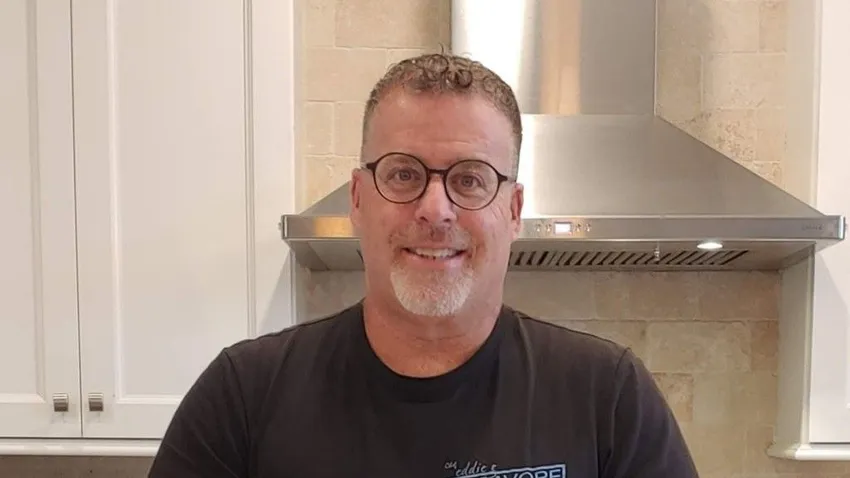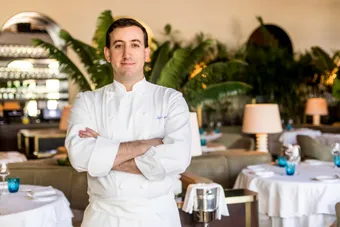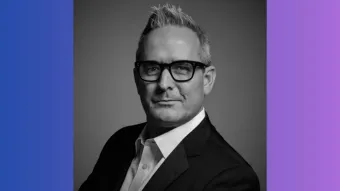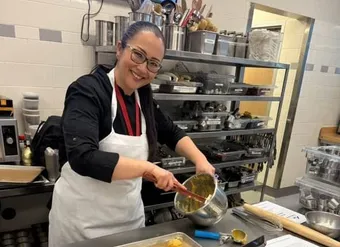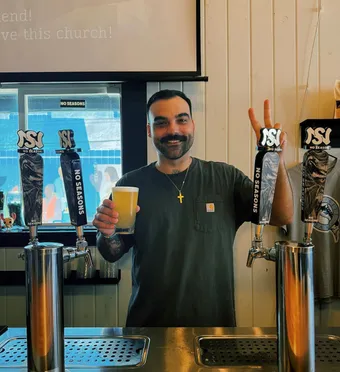Chef Eddie G’s career began in the most unassuming way: as a 13-year-old in New York, tagging along with older friends to a local Italian restaurant.
Decades later, he’s worked in a thousand kitchens, owned five restaurants, built a television presence and cooked around the world.
We at OysterLink recently sat down with Chef Eddie G, partner at Locavore Ventures, to talk about his journey, work ethic and legacy.
How did you make your start in the hospitality industry?
Chef Eddie G: Oh, that’s hilarious. All of the guys I used to hang out with were five, six, seven, even ten years older than me, and they all worked in this Italian spot here in New York.
They said, “You gotta come, we have a Dishwasher position open.” I was 13, so I thought, they’re not going to hire me. But I went in, did the interview, and got the job.
It started as dishwashing, then I got promoted to Pot Washer, then Prep Cook, and then Line Cook. My parents only let me work on days when I didn’t have school the next day, so it fit into my life.
What started as a summer job in 1980 is still my life, 45 years later.
About 20 years ago, cameras came into the kitchen. A lot of people scattered — old felony records, ex-wives, whatever — but I didn’t mind talking to the camera. That led to TV.
Over the years, I’ve owned five restaurants and worked in probably a thousand kitchens through travel and shows.
I’ve been fortunate. I was at the right place, at the right time, and I put in hard work, staying clear of most of the big vices in this business.
I still work 70-hour weeks, but to me, it’s not work. It’s a lifestyle.
How does your typical workday look?
Chef Eddie G: It depends. I call Montauk — out here in the Hamptons — my off-season. My on-season is during NFL football and the Food Network’s food and wine festivals.
Out here, I’m up by six or seven, trade some stocks, handle board duties for a few companies and then bike to my office on the water.
The team starts arriving around 11, we open at noon at Gosman’s, and we finish around 10 at night. Then I’ll bike to the beach, listen to the Mets, and take calls with contacts in California, Mexico, or Brazil.
When I’m on the road, it’s different. Every Monday in a new city, production meetings on Tuesday, events and filming midweek, and big dinners or festivals leading into the weekend.
Out here, I can also work on my next cookbook and a local food-community project.
You mentioned you have a team. Who’s on it, and how do you build it?
Chef Eddie G: I have three booking agents. Two of them used to work for the NFL, and they create opportunities for me. On the production side, there are five or six people: editors, producers, and directors.
On the culinary side, I either travel with Sous Chefs or pick up help locally. At festivals, you get interns, tell them to cut garlic or prep shrimp, and everyone’s got a role.
How do you make sure your team members are capable?
Chef Eddie G: Here’s the thing. It’s always about a team. It’s never about I or me; it’s us and we.
But with that being said, as a Chef, there has to be one guy in charge of the kitchen, no matter who that is.
And I’m totally fine if I’m the Sous Chef and there’s somebody in front of me, but generally I’m the Chef.
You just need hands. You need people to chop parsley, cut onions, cut the meat down, prep the shrimp, or whatever we’re doing. A lot of times, you just need hands.
I can put the finishing touches. I can make sure the sauces are all tight and everything’s done right — the final work. The whole process is almost like building a house.
With automation in kitchens, are those hands replaceable?
Chef Eddie G: Technology will definitely be part of the future, but you can’t replace the personality, love, and passion that goes into food.
A machine might make hollandaise faster, but it can’t replicate the 40 years of experience and care that go into bringing that hollandaise to your table.
People hire me to cook for them. It’s hard enough to replace me with another chef, never mind a machine. In my lifetime, I think my job is safe.
What kind of personality succeeds in this industry?
Chef Eddie G: If you want to take a step back, more than just succeeding in culinary, you’d need to have a good work ethic to succeed in life.
Show up on time, be clean, and shower. I shower five times a day because I’m neurotically clean.
You’ve got to be at work on time, ready, and willing to learn. I’ve been doing this for how many years, but I’m always learning.
It’s always about learning and new techniques, new menus, new things I’ve never seen before.
I can train anybody to be a good cook and to be able to hold their own in a kitchen. It’s just a matter of people willing to heed the advice.
Do you remember how you opened your first restaurant?
Chef Eddie G: I remember all of them, believe it or not. I was 21 years old at the time. It was a rundown sports bar. You had to be 21 to own a liquor license in New York. I sold my Jeep, baseball cards and everything I owned to open up this restaurant.
Thank goodness it was profitable from day one. I put a kitchen in it. Thankfully, we started doing almost a million dollars a year right out of the gate. This was a number of years ago.
Many say this business is always a struggle, yet it seems easy for you.
Chef Eddie G: I think I was just lucky. I hit a niche in a working-class town and provided value to people. No one wants to feel ripped off when they leave a restaurant.
Today, you see $90 tabs for three drinks. People still want the experience to match the price.
The first place I owned was in a working-class town. I had lived in the town for a number of years. The building became available, and I got in there.
I was at work from 8:00 every morning and would leave at 4:00 in the morning. It was hard, and it killed your body and the whole nine yards.
It all goes back to work ethic and luck. I hit a niche, and I knew I could add value. Because at the end of the day, in this industry, people don’t want to feel screwed.
When they leave you, they want to have a great meal, great conversation, and they don’t want to feel like they got ripped off.
What trends are you seeing now in the industry?
Chef Eddie G: Traveling all over the place, what I found consistent was that in every city, you read about how they’re becoming a foodie destination. So I love that the spotlight is being put on culinary, and it seems to keep mushrooming. It keeps growing.
Another trend I see is obviously “clean eating.” Everybody wants clean eating, avoiding carbohydrates and getting a lot more protein. I also see a lot of “fusion.” And I love trying different things that usually don’t go together and making them go together.
One last trend I see is utilizing the whole animal, often in protein. So I think it’s kind of everybody’s becoming a foodie town, foodie city, and it just continues to grow.
How do you think Chefs became celebrities?
You won't believe me, but Julia Child probably started it, along with Wolfgang Puck and Anthony Bourdain.
Back then, kitchens were hidden and often staffed by guys who couldn’t get jobs in banks or offices, people with rough pasts. You never saw the cooks.
Then open kitchens appeared, and I started going out to talk to guests, asking how their meal was and how we could improve.
When TV came into it — my first show, Coast to Coast Cuisine, aired about 20 years ago — I remember thinking, “Am I famous now?” But you’re not; you’re just a guy with a camera in your face.
These days, you’ve got Bobby Flay or Guy Fieri — they’re more actors than chefs. They couldn’t run a kitchen doing a thousand covers and sweating for hours. I don’t love the word “celebrity.” I prefer “trusted source.”
If I tell you I’ve got great knives, you can trust me. If you want to know how to pan-sear halibut, hopefully you’ll come to me.
Any advice for someone just starting in the industry?
Chef Eddie G: I always joke about becoming a dentist instead. You’re off when everyone’s working, you’re working when everyone’s off, you miss every holiday, and it kills marriages.
Most restaurants go out of business. So why choose it?
But truthfully, I wouldn’t do anything else. I’ve never had a job outside this industry and couldn’t sit in a cubicle or work a traditional nine-to-five schedule. Every day is different.
My real advice? Learn from everything. Spend a couple of years in Japanese, Italian, and French kitchens. Go to Europe. Travel, eat, meet people, and see that America isn’t the only place with great cuisine. Make it a lifestyle. I haven’t worked a day in my life.
Chef Eddie G’s story is a reminder that the most unexpected career turns often come from the people and moments we least expect.
His decision to stay when others left wasn’t calculated — it was instinct. And that instinct, paired with persistence, opened doors to experiences that shaped his entire career.
In a world where quick wins are celebrated, his journey shows the value of patience, loyalty and being ready when the right opportunity arrives.
Sometimes, staying put can take you further than chasing the next big thing.
Check out more interviews like this brought to you by OysterLink, or get them straight to your email by creating an OysterLink account and joining our newsletter.
